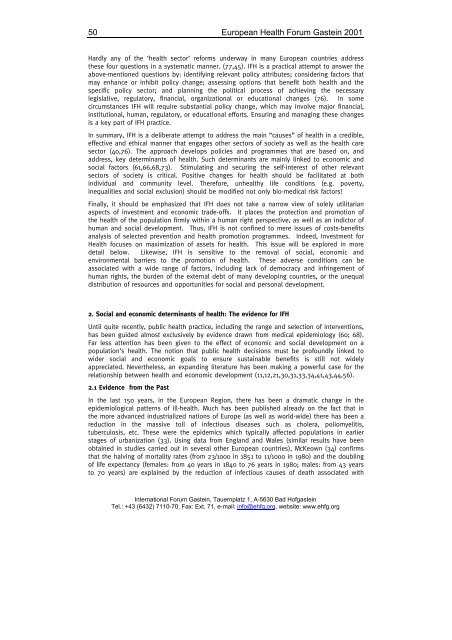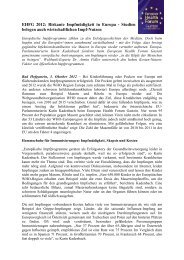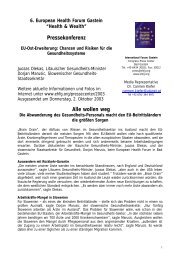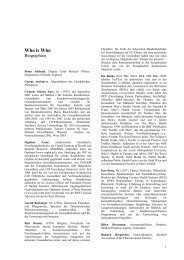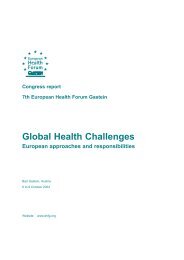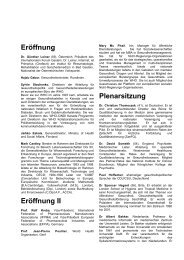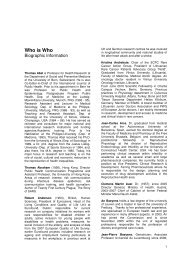Congress report - European Health Forum Gastein
Congress report - European Health Forum Gastein
Congress report - European Health Forum Gastein
Create successful ePaper yourself
Turn your PDF publications into a flip-book with our unique Google optimized e-Paper software.
50<br />
<strong>European</strong> <strong>Health</strong> <strong>Forum</strong> <strong>Gastein</strong> 2001<br />
Hardly any of the ‘health sector’ reforms underway in many <strong>European</strong> countries address<br />
these four questions in a systematic manner. (77,45). IFH is a practical attempt to answer the<br />
above-mentioned questions by: identifying relevant policy attributes; considering factors that<br />
may enhance or inhibit policy change; assessing options that benefit both health and the<br />
specific policy sector; and planning the political process of achieving the necessary<br />
legislative, regulatory, financial, organizational or educational changes (76). In some<br />
circumstances IFH will require substantial policy change, which may involve major financial,<br />
institutional, human, regulatory, or educational efforts. Ensuring and managing these changes<br />
is a key part of IFH practice.<br />
In summary, IFH is a deliberate attempt to address the main “causes” of health in a credible,<br />
effective and ethical manner that engages other sectors of society as well as the health care<br />
sector (40,76). The approach develops policies and programmes that are based on, and<br />
address, key determinants of health. Such determinants are mainly linked to economic and<br />
social factors (61,66,68,73). Stimulating and securing the self-interest of other relevant<br />
sectors of society is critical. Positive changes for health should be facilitated at both<br />
individual and community level. Therefore, unhealthy life conditions (e.g. poverty,<br />
inequalities and social exclusion) should be modified not only bio-medical risk factors!<br />
Finally, it should be emphasized that IFH does not take a narrow view of solely utilitarian<br />
aspects of investment and economic trade-offs. It places the protection and promotion of<br />
the health of the population firmly within a human right perspective, as well as an indictor of<br />
human and social development. Thus, IFH is not confined to mere issues of costs-benefits<br />
analysis of selected prevention and health promotion programmes. Indeed, Investment for<br />
<strong>Health</strong> focuses on maximization of assets for health. This issue will be explored in more<br />
detail below. Likewise, IFH is sensitive to the removal of social, economic and<br />
environmental barriers to the promotion of health. These adverse conditions can be<br />
associated with a wide range of factors, including lack of democracy and infringement of<br />
human rights, the burden of the external debt of many developing countries, or the unequal<br />
distribution of resources and opportunities for social and personal development.<br />
2. Social and economic determinants of health: The evidence for IFH<br />
Until quite recently, public health practice, including the range and selection of interventions,<br />
has been guided almost exclusively by evidence drawn from medical epidemiology (60; 68).<br />
Far less attention has been given to the effect of economic and social development on a<br />
population’s health. The notion that public health decisions must be profoundly linked to<br />
wider social and economic goals to ensure sustainable benefits is still not widely<br />
appreciated. Nevertheless, an expanding literature has been making a powerful case for the<br />
relationship between health and economic development (11,12,21,30,31,33,34,41,43,44,56).<br />
2.1 Evidence from the Past<br />
In the last 150 years, in the <strong>European</strong> Region, there has been a dramatic change in the<br />
epidemiological patterns of ill-health. Much has been published already on the fact that in<br />
the more advanced industrialized nations of Europe (as well as world-wide) there has been a<br />
reduction in the massive toll of infectious diseases such as cholera, poliomyelitis,<br />
tuberculosis, etc. These were the epidemics which typically affected populations in earlier<br />
stages of urbanization (33). Using data from England and Wales (similar results have been<br />
obtained in studies carried out in several other <strong>European</strong> countries), McKeown (34) confirms<br />
that the halving of mortality rates (from 23/1000 in 1851 to 11/1000 in 1980) and the doubling<br />
of life expectancy (females: from 40 years in 1840 to 76 years in 1980; males: from 43 years<br />
to 70 years) are explained by the reduction of infectious causes of death associated with<br />
International <strong>Forum</strong> <strong>Gastein</strong>, Tauernplatz 1, A-5630 Bad Hofgastein<br />
Tel.: +43 (6432) 7110-70, Fax: Ext. 71, e-mail: info@ehfg.org, website: www.ehfg.org


